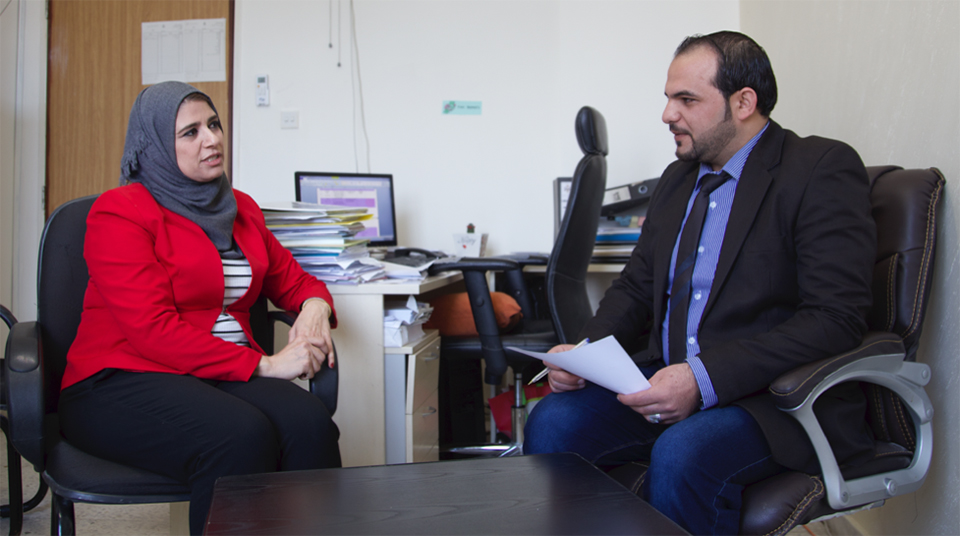My take, your take: Challenging Social Attitudes and Gender Expectations in Jordan
Generations For Peace is joining UN Women’s intergenerational series for Generation Equality, where young people take the lead to shape the conversation. In this series, young people, conduct interviews with prominent women who were able to create real change and leave a lasting positive impact in the advancement of women’s empowerment and gender equality. Ibrahim Abu-AlHob, 25, volunteering with Generations For Peace and UN Women, under the ‘Youth for Women, Peace and Security’ programme generously funded by the European Union, talks with Muna Rfou, Director of the Gender Unit at the Ministry of Social Development, and a Coalition Member of the Jordanian National Action Plan (JONAP) for the implementation of the UN Security Council Resolution 1325 on Women, Peace and Security.Date:

Ibrahim Abu-AlHob interviews Muna Rfou on the challenges that face women in Jordan and ways to overcome them. Photo: Generations For Peace/Noor AbuZaid
Ibrahim Abu-AlHob, 25, believes youth and women can play a key role in preventing conflict and building a community that promotes peace and security. He chose to actively make a difference and began volunteering with Generations For Peace and UN Women in the “Youth for Women, Peace and Security” Programme.
During his conversation with Muna Rfou, Abu-AlHob, listens as she emphasizes the importance of promoting women’s empowerment “Women play an important role in the society because when women are empowered, this has a positive cascading effect in all areas of our lives. Empowering women is the equivalent of empowering the society as a whole because it is the women who are raising the generations.”
Reflecting on the discussion, Abu-AlHob, added, “The importance of empowering women cannot be underestimated. When there are examples of female role models and leaders, more women are encouraged to follow suit and get involved as well.”
When and why did you join this field of work?
Muna Rfou: I first began my career with the Jordanian Ministry of Social Development in 1999, which allowed me to gain valuable professional career skills and experience. In 2011, I started to work in the area of women’s empowerment and gender equality, and in doing so, it became a passion of mine to continue advocating for women’s rights. This was also an important learning opportunity to deepen my knowledge in this field.
However, when I first decided to get involved in advocating for women’s rights, I was sure that I would face many challenges. Yet my passion for this cause and my strong motivation helped continuing in this field of work and not to give up. Joining the Coalition that developed Jordan’s National Action Plan (JONAP) for the implementation of the UN Security Council Resolution 1325 on Women, Peace and Security was significant turning point, and I am proud to still be involved to this day.
I know I made the right decision, and it is very rewarding to know that my work is directly supporting and encouraging women to become leaders and strong members in our society. I can see the many tangible accomplishments that the Gender Unit at the Ministry of Social Development has been able to achieve. I am very proud of the incremental awareness on the importance of empowering women in all aspects of life, including economic, political, and social. This motivates me to keep going, accomplish more, and continue making positive change!
What are the challenges you and other women face in this field of work?
Muna Rfou: Unfortunately, in our society, Jordanian women face many challenges across the economic, political, and social fields, as well as the others. For me personally, I faced the biggest challenges at the beginning of my career, especially when trying to raise awareness on women’s empowerment among my colleagues. With time, I was able to change their perspectives through scientific evidence based on studies, data, and statistics on the importance of the issue. This really impacted the way in which others viewed the issue, and ultimately led to stronger commitment to address socio-economic barriers faced by women, and to support women both inside and outside the Ministry.
In your opinion, what hasn’t changed yet for women in Jordan? Where do we go from here?
Muna Rfou: I absolutely believe in the need to provide more space for women’s economic empowerment and to expand their access to opportunities in all fields. We also need to take into consideration the needs of women who have been victims of violence and conflict. By providing women with the necessary support, we can pave the way to their own success.
It is my hope that Jordanian women will play a greater role in building peace and spreading a culture of peace across Jordan, but also across the world. I believe that government institutions should support and prioritise women’s economic empowerment, because this means that they are enabled to overcome the cycles of violence and poverty. We need to give women a chance.
This is a special editorial series for UN Women’s Generation Equality campaign. The intergenerational series connects youth activists with veteran women’s rights advocates and explored intergenerational perspectives on today’s issues. Generations For Peace and UN Women, with the support of the European Union, are mobilizing 33,000 youth across Jordan to raise awareness on the important role women can play in preventing conflict, promoting peace and security, under the ‘Youth for Women, Peace and Security’ programme.